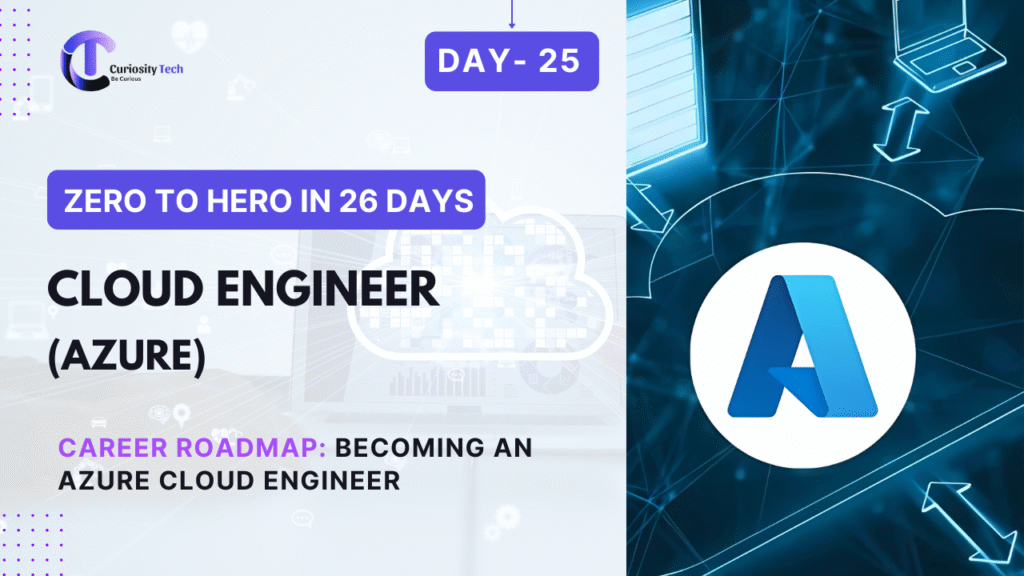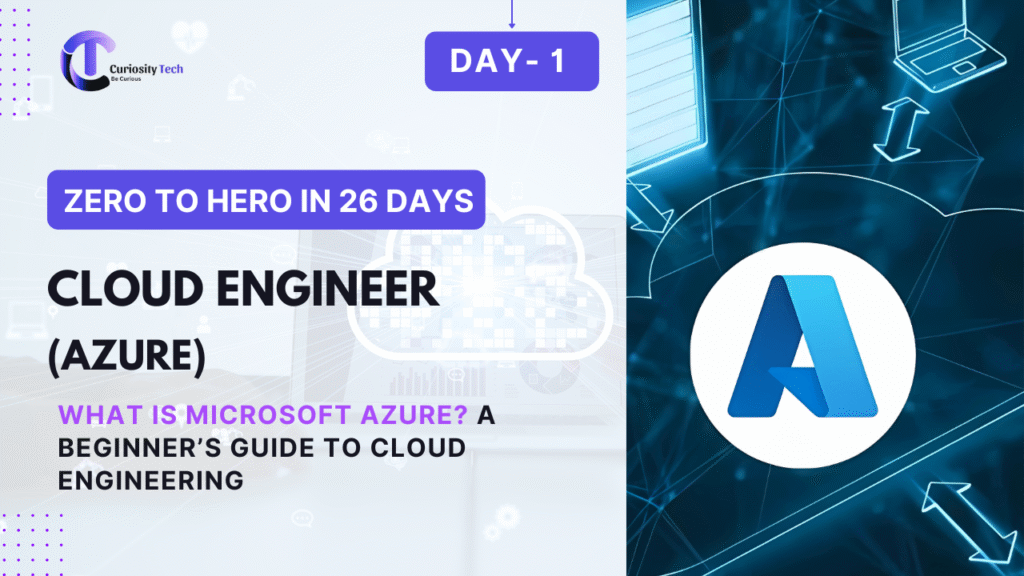Introduction
A career as an Azure Cloud Engineer offers high growth, diverse opportunities, and competitive salaries. With cloud adoption rising globally, skilled Azure engineers are in high demand. Building a career in this field requires strategic planning, hands-on experience, certification, and continuous learning.
At curiositytech.in, learners get step-by-step guidance, practical projects, and mentorship to transition from beginners to Azure experts.
1. Role Overview: Azure Cloud Engineer
Responsibilities:
- Design, deploy, and manage cloud solutions on Azure
- Implement virtual networks, storage, compute, and serverless services
- Configure security, identity management, and monitoring
- Work with DevOps pipelines, automation, and CI/CD
- Collaborate with developers, architects, and stakeholders
Skills Required:
- Azure Resource Management
- Networking (VNets, Load Balancers, NSGs)
- Compute Services (VMs, App Services, AKS)
- Storage & Database Solutions (Blob, SQL, Cosmos DB)
- Security & Compliance (Azure AD, Sentinel, Policies)
- Automation & DevOps (ARM, Bicep, Terraform, Azure DevOps)
2. Career Roadmap
Stepwise Progression:
| Stage | Focus Area | Suggested Actions |
| Beginner / Fundamentals | Cloud basics, Azure portal navigation | AZ-900 certification, curiositytech.in labs |
| Associate / Implementation | Core Azure services, VM, Storage, Networking | AZ-104 / AZ-204 certification, hands-on projects |
| Advanced / Expert | Architecture, AKS, DevOps, AI integration | AZ-305 / AZ-400, curiositytech.in case studies |
| Specialization | AI, Data Engineering, Security | AI-102, DP-203, SC-200, Azure Arc labs |
| Leadership / Cloud Architect | Design enterprise solutions, cost optimization | Lead projects, mentor teams, implement multi-region solutions |
Diagram: Azure Cloud Engineer Career Ladder

3. Step-by-Step Action Plan
Step 1: Build Strong Foundations
- Learn cloud computing concepts
- Understand Azure services, pricing models, and SLA
- Complete AZ-900 and hands-on labs at curiositytech.in
Step 2: Gain Practical Experience
- Deploy Resource Groups, VMs, Storage Accounts, VNets
- Configure App Services, Azure Functions, AKS clusters
- Implement security and access control using Azure AD
Step 3: Specialize in Core Domains
- DevOps: Implement CI/CD with Azure DevOps Pipelines
- AI & Machine Learning: Work with Cognitive Services and Azure OpenAI
- Hybrid & Multi-Cloud: Use Azure Arc and Stack for governance
Step 4: Get Certified
- Pursue AZ-104, AZ-204, AZ-305 certifications for credibility
- Complete specialty certifications to demonstrate expertise
Step 5: Advance to Expert Roles
- Design enterprise-scale multi-region architectures
- Lead cloud migration projects and optimize cost/performance
- Mentor junior engineers and share best practices
4. Real-World Example: Career Journey
Case Study:
- Starting Point: Beginner learning AZ-900 fundamentals
- Year 1: Complete AZ-104, deploy VMs, storage, and networks in curiositytech.in labs
- Year 2: AZ-204, implement App Services, Azure Functions, and CI/CD pipelines
- Year 3: AZ-305, design multi-region, hybrid, and AI-integrated architectures
- Year 4+: Specialty certifications in AI, Data, or Security, lead projects, mentor teams
Outcome:
- Strong portfolio with hands-on projects
- Certified credentials recognized by employers
- Ready for Azure Cloud Engineer or Cloud Architect positions
5. Skills & Tools Checklist
| Skill Area | Tools / Services |
| Compute & Networking | VMs, App Services, AKS, VNets |
| Storage & Databases | Blob Storage, SQL Managed Instance, Cosmos DB |
| Identity & Security | Azure AD, RBAC, Sentinel, Policies |
| DevOps & Automation | Azure DevOps, GitHub Actions, ARM, Bicep, Terraform |
| AI & ML | Cognitive Services, Azure OpenAI, AutoML |
| Monitoring & Optimization | Azure Monitor, Log Analytics, Application Insights |
6. Expert Tips for Career Success
- Hands-On Projects: Practice deployment, monitoring, and scaling in real-world scenarios
- Stay Updated: Follow Azure trends, new services, and updates in 2025
- Mentorship: Engage with mentors at curiositytech.in to accelerate learning
- Soft Skills: Communication, problem-solving, and collaboration are critical
- Portfolio Development: Document projects, labs, and certifications for job applications
Conclusion
A successful career as an Azure Cloud Engineer requires foundations, certifications, hands-on experience, specialization, and continuous learning. By following a structured roadmap, leveraging curiositytech.in labs and projects, and keeping pace with Azure 2025 trends, engineers can advance from beginner to expert and secure leadership roles in cloud architecture.



